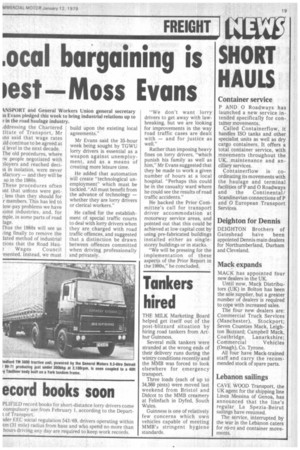Awl bargaining is pest Moss Evans
Page 21

If you've noticed an error in this article please click here to report it so we can fix it.
kNSPORT and General Workers Union general secretary ss Evans pledged this week to bring industrial relations up to a in the road haulage industry.
,ddressing the Chartered titute of Transport, Mr ins said that wage rates ild continue to be agreed at tI level in the next decade. The old procedures, where people negotiated with )loyers and reached deciis in isolation, were never sfac tory — and they will be so in the 1980s.
These procedures often int that unions were geeless than they should for r members. This has led to low-pay problems we have ;ome industries, and, for mple, in some parts of road lage.
rhus the 1980s will see us ring finally to remove the lated method of industrial tions that the Road Hau Wages Council .esented. Instead, we must build upon the existing local agreements."
Mr Evans said the 35-hour week being sought by TGWU lorry drivers is essential as a weapon against unemployment, and as a means of creating more leisure time.
He added that automation Will create "technological unemployment" which must be tackled. "All must benefit from the advance of technology — whether they are lorry drivers or clerical workers."
He called for the establishment of special traffic courts to deal with lorry drivers when they are charged with road traffic offences, and suggested that a distinction be drawn between offences committed when driving professionally and privately. "We don't want lorry drivers to get away with lawbreaking, but we are looking for improvements in the way toad traffic cases are dealt with — and for justice as well."
Rather than imposing heavy fines on lorry drivers, "which punish his family as well as him," Mr Evans suggested that they be made to work a given number of hours at a local hospital. "Perhaps this could be in the casualty ward where he could see the results of road traffic accidents."
He backed the Prior Committee's call for transport driver accommodation at motorway service areas, and pointed out that this could be achieved at low capital cost by using pre-fabricated buildings installed either as singlestorey buildings or in stacks.
"We will be pressing for the implementation of these aspects of the Prior Report in the 1980s," he concluded.
































































































































